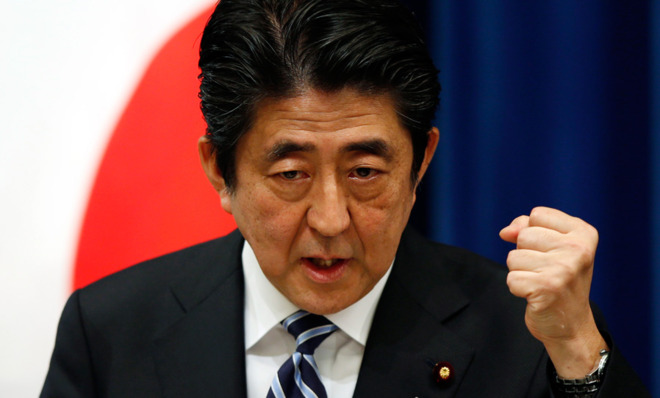How Japan's Shinzo Abe turned an economic recovery into a train wreck
Want to crush a recovery? Hike taxes.

A free daily email with the biggest news stories of the day – and the best features from TheWeek.com
You are now subscribed
Your newsletter sign-up was successful
Last year it was all looking so rosy. The Japanese economy was growing, the stock market was up, and consumer prices were finally beginning to rise after years of deflation. Economic analysts, including me, praised Japanese Prime Minister Shinzo Abe's monetary and fiscal stimulus, aka "Abenomics," calling it a bold but necessary solution to decades of economic stagnation. Then it all came crashing down.
In a truly awful second quarter, Japan's economy fell of a cliff, shrinking 1.8 percent between April and June, or an incredible 7.1 percent on an annualized basis.
That's brutal. And it's a slap in the face of Japan's government, which has made restoring the Japanese economy to health its highest priority. Abe said in April that the hikes were necessary to "keep Japan's economy on track."
The Week
Escape your echo chamber. Get the facts behind the news, plus analysis from multiple perspectives.

Sign up for The Week's Free Newsletters
From our morning news briefing to a weekly Good News Newsletter, get the best of The Week delivered directly to your inbox.
From our morning news briefing to a weekly Good News Newsletter, get the best of The Week delivered directly to your inbox.
So, what went wrong? As BBC News notes:
The single biggest factor behind the contraction in the second quarter is thought to be a rise in the nation's sales tax in April, to 8 percent from 5 percent. [BBC News]
That was an extremely risky move. Consumption makes up a hefty 60 percent of the Japanese economy, so changes to sales taxes have profound effects nationwide. And the last time Japan's sales tax rose was in 1997 when it rose from 3 percent to 5 percent.
Similarly, that move tipped a recovering Japanese economy back into recession. And Ryutaro Hashimoto, the Japanese prime minister at the time, was kicked out of office soon afterwards.
The explanation for why this is a problem is shockingly simple. When you tax a thing or an activity, you discourage it by raising its cost. When you raise taxes on something, you discourage it even more. And when that something makes up 60 percent of your economy, you're creating incentives for the economy to shrink. That's not "keeping the economy on track." That's willfully derailing it.
A free daily email with the biggest news stories of the day – and the best features from TheWeek.com
Of course, the reasoning behind the tax hikes is not totally foolish. The tax increase is aimed at covering rising welfare costs attributable to Japan's aging population. Japan has a very low birth rate — the second lowest in the world behind only Monaco. In 2012, according to Bloomberg, diapers for incontinent adults began to outsell diapers for babies. And Japan also has the world's highest ratio of elderly to young people, as well as the highest level of government debt per capita in the world.
That means that the Japanese government will, in the long run, need to raise revenue in order to remain fiscally solvent. But interest rates on Japanese government borrowing remain super-low, suggesting that measures to raise government revenue are a future consideration, far less important than the weak state of the wider economy. Gross domestic product in Japan is still lower than it was for much of the 1990s. If you're going to raise revenue, at least get out of the slump first!
And there are undoubtedly better things to tax (and therefore discourage) than sales. For example, taxing carbon dioxide emissions would disincentivize something that is actually harmful to society and the planet.
Of course, hiking taxes isn't the only way to raise government revenue and deal with Japan's demographic challenges. Japan could offset the risks of supporting a large elderly population by liberalizing immigration so that younger people from around the world can move there to work and pay taxes. Another route would be to increase subsidies for the birth of babies (who will grow up to work and pay taxes). Abe has talked about liberalizing immigration, but — unlike with the tax hikes — has not delivered yet.
At least Abe's advisers are advising him to put another planned sales tax hike — initially planned for next year — on hold for now. Abe's government is hoping that the economy bounces back in the third quarter. But the damage to economic confidence may well already have been done. Last year, the Japanese government laid the groundwork to climb out of the pit their economy has been in for the past 20 years. Business confidence rose back into moderately positive terrain for the first time since the 2008 global financial crisis. This year, business confidence is beginning to fall again, suggesting that those tax hikes might have undone a lot of that hard work.
John Aziz is the economics and business correspondent at TheWeek.com. He is also an associate editor at Pieria.co.uk. Previously his work has appeared on Business Insider, Zero Hedge, and Noahpinion.
-
 The EU’s war on fast fashion
The EU’s war on fast fashionIn the Spotlight Bloc launches investigation into Shein over sale of weapons and ‘childlike’ sex dolls, alongside efforts to tax e-commerce giants and combat textile waste
-
 How to Get to Heaven from Belfast: a ‘highly entertaining ride’
How to Get to Heaven from Belfast: a ‘highly entertaining ride’The Week Recommends Mystery-comedy from the creator of Derry Girls should be ‘your new binge-watch’
-
 The 8 best TV shows of the 1960s
The 8 best TV shows of the 1960sThe standout shows of this decade take viewers from outer space to the Wild West